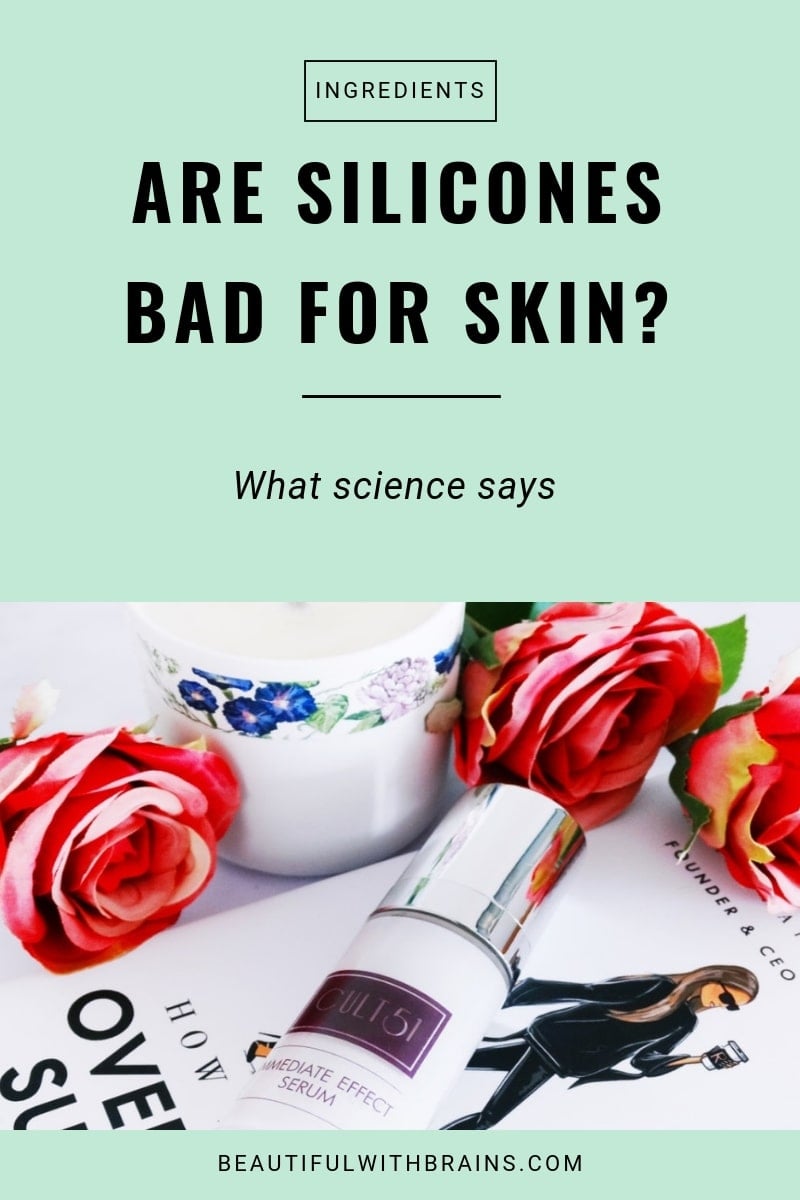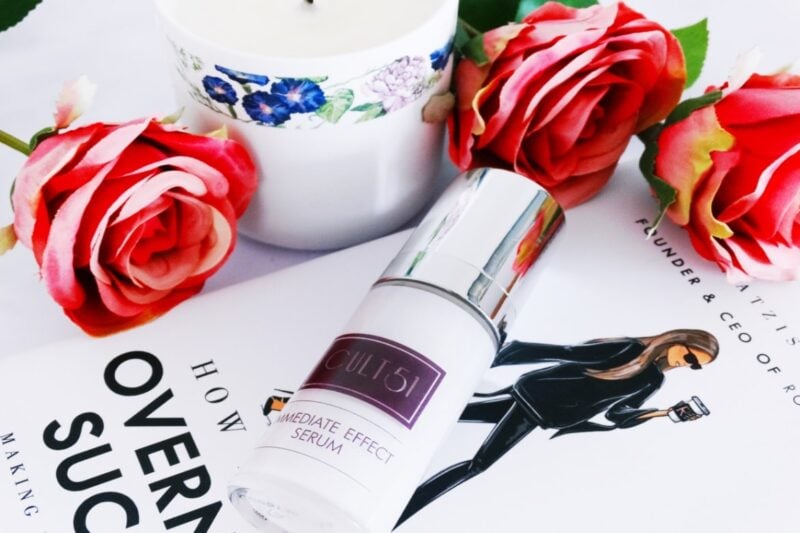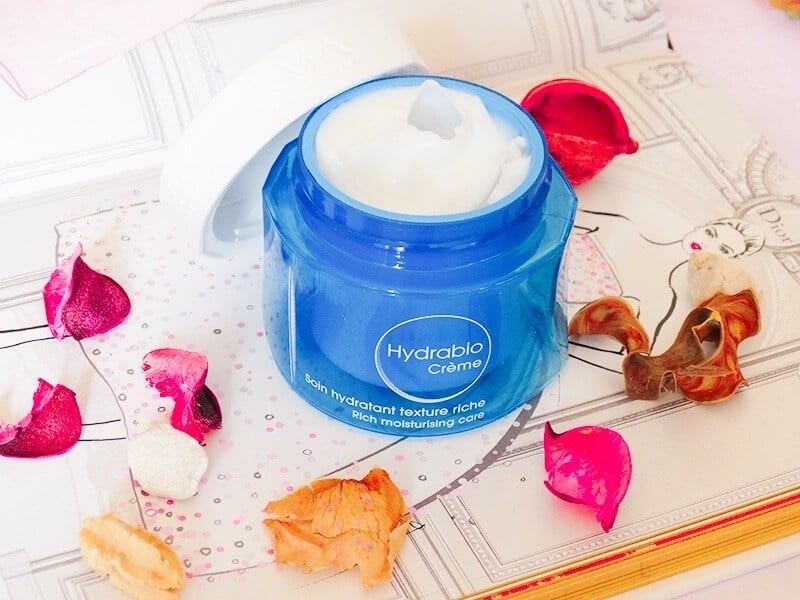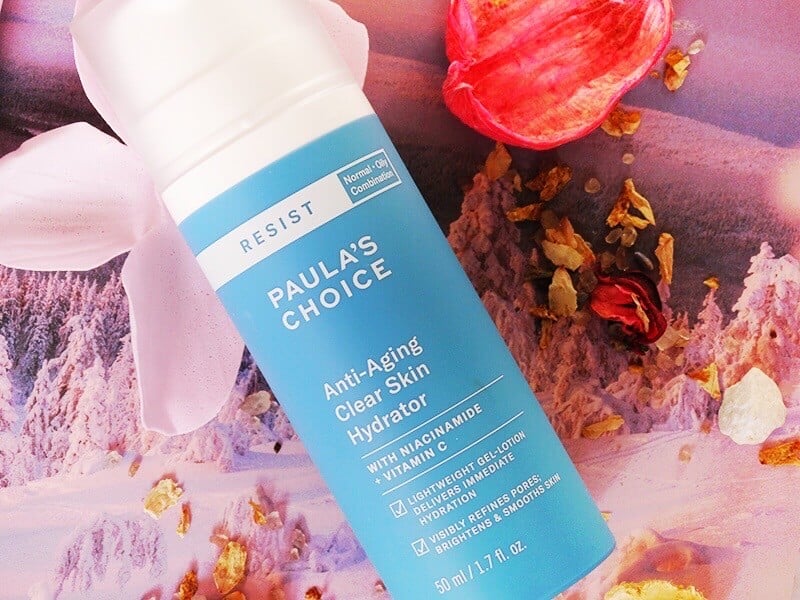
Ah, silicones. No one wants them. But, when they aren’t there, everyone complains.
Well, they don’t complain of a lack of silicones. They complain of thick pastes that spread like chalk or hair that refuses to be combed through. You know, all those things silicones are there to fix.
Turns out, silicones are quite the handymen. But, they totally suck at self-promotion. They’re even too shy to tell women how they can help. So, others did it for them and now they’re stuck with a bad rep.
How unfair! It’s time to set the record straight once and for all about silicones. Here’s what silicones in skincare do and why you shouldn’t be scared of them (plus the REAL reason why some of you may want to avoid them after all):
What Are Silicones?
Silicones are derived from silica, a common mineral that makes up a huge part of the Earth’s crust.
Here’s an easy trick to spot them on the label: they end in “cone” or “siloxane”:
- Amodimethicone
- Cyclomethicone
- Cyclohexasiloxane
- Cyclopentasiloxane
- Dimethicone
- Phenyl trimethicone
There are more, but it’ll take too long to listen them all. These are the most common and you know how to recognise the rest now.
What Are The Most Common Types Of Silicones In Skincare?
Here are the 3 most common silicones you’ll find in skincare and haircare products. Although they belong to the same family, they all behave a little differently:
Amodimethicone: A silicone that’s been modified to better stick to hair. It’s a great moisturiser, but hard to remove. May cause buildup overtime.
Cyclopentasiloxane: One of the most volatile silicones (it’s water-based), it gives amazing slip to moisturisers and conditioners. It makes them glide on smoothly and then quickly evaporates. No need to worry about buildup with this one.
Dimethicone: The heaviest silicone of all. It’s not water-soluble so it’s the most difficult to remove. If you use too much of it, it can buildup overtime.
Want to know what ingredients you really need to avoid in your skincare products? Sign up to the newsletter below to receive the “Skincare Ingredients To Avoid” cheatsheet:
What Do Silicones In Skincare Do?
Think of silicones as foundation or concealer. They make everything look and feel that little bit better and hide all sorts of imperfections:
- Silicones give serums and moisturizers a luxurious texture that spreads effortlessly on the skin
- Silicones create a film on the skin that locks moisture in, keeping skin hydrated
- Silicones fill in fine lines and wrinkles so they look smaller
- Silicones makes skin feel silky soft to the touch
- Silicones make hair super shiny (they smoothen out the cuticles so they can better reflect light)
- Silicones makes detangling and combing through hair a breeze (this reduces breakage, too)
- Silicones protect hair from heat
But just like foundation, once you take silicones off, your imperfections are still there, as obvious as before.
Should You Avoid Silicones In Skincare?
Silicones are accused of all kinds of bad stuff, so let’s go through these “dangers” one by one, shall we?
Do Silicones Suffocate Skin?
It’s true that silicones create a barrier on the skin that locks moisture in. But, this barrier doesn’t suffocate skin. Skin doesn’t have lungs. Without lungs, it can’t breathe or be suffocated.
“Ok, know-it-all”, I hear you say, “but doesn’t that barrier prevent skin from doing its thing (i.e. perspire)?”
Nope. You see, this barrier is quite peculiar. Silicones have a particular molecule structure, which is made of larger molecules with wider spaces between each molecule.
That means they can trap water in without interfering with your skin’s natural functions, like perspiration. Phew!
VERDICT: Silicones don’t suffocate skin.

Do Silicones Prevent Other Skincare Ingredients From Penetrating Into The Skin?
This myth is closely related to the previous one. If the barrier silicones create suffocates skin, it makes sense it also prevents active ingredients (like retinol and Vitamin C) to penetrate into your skin, where they can do their antiaging magic.
But you already know this barrier has gaps that allow skin to perspire. Vitamin C, retinol, & co also gets through those gaps and into your skin – just where you want them.
VERDICT: No, silicones don’t prevent active ingredients from penetrating into your skin completely.
Related: Do Silicones Prevent Other Ingredients From Penetrating The Skin?
Are Silicones Comedogenic?
Some people use silicones and break out like crazy. Others use them and don’t get a single pimple. What’s going on?
Here’s the deal: silicones themselves are NOT comedogenic. Not even Dimethicone, the heaviest of them all. But, if you use silicones together with comedogenic ingredients, they can make you break out.
Why? Simple: the protective barrier silicones create on your skin traps everything underneath (ok, it’s not 100% foolproof, but it does trap a lot of stuff where there are no gaps).
If something highly comedogenic, like coconut oil, gets trapped underneath this barrier, you’ll likely get a few pimples.
Luckily, this is easy to avoid. Just be careful what you use silicones with!
VERDICT: No, silicones are not comedogenic. But they’ll make you breakout if you use them with comedogenic ingredients.
Related: What Ingredients Are Comedogenic?

Do Silicones Cause Product Buildup On Hair?
Silicones do accumulate on your scalp, this much is true. That residue weights your locks down, turning your voluminous mane into a flat pancake.
But, I’m assuming you’re washing your hair, right? If you do, you’ll remove the old silicones residue before adding a new dose (usually with a conditioner).
If you do, they never have the time to accumulate to the point buildup becomes an issue. Phew!
VERDICT: Silicones cause hair buildup, but a good washing gets rid of it quickly.
Related: How To Easily Remove Silicones Buildup From Hair
Do Silicones Make Your Skin Age Faster?
There’s this rumour going around that silicones damage skin and make it age faster. I don’t know how it started, but it’s 100% false. There’s not the tiniest shred of evidence this is true.
But if silicones don’t make your skin age faster, they don’t even make it age more slowly.
As I mentioned above, silicones are like foundation: they prettify skin, but don’t really have any skincare benefits.
Think of silicones like junk food: they satisfy the craving but don’t nourish the body.
If you want something that makes your wrinkles look smaller while your retinol takes its sweet time to work, silicones will do the trick. But, once you take them off, your wrinkles are still there, as big as before.
This doesn’t make silicones bad or useless. It just depends on what you’re looking for in your cosmetics.
VERDICT: Silicones don’t make you age faster. But they don’t slow down premature aging, either.
Related: Prevention VS Treatment: What Really Works To Get Rid Of Wrinkles?

Are Silicones Bad For The Environment?
If you must give up on silicones, do it for a valid reason. Like this one: silicones aren’t biodegradable.
Some types of silicones can be recycled, but that’s unlikely to happen to the silicones you wash down the drain when you cleanse your skin at night.
If this is a big issue for you, you may want to use silicones less or not at all.
VERDICT: Silicones aren’t bad for skin. But they are bad for the environment.
The Bottom Line
Silicones don’t ruin your skin or cause any serious damage. They simply provide a quick fix for wrinkles and a better sensory experience with cosmetics. If you’re looking for more or are worried about their impact on the environment, give them a pass. Otherwise, there’s no reason not to play with them.
Do you use products with silicones or prefer to avoid them? Share your thoughts in the comments below.

hmm, this ingredient doesn’t seem to cause any problem for me. i tried tarte clean slate and find it super mattifying. then someone told me it contains lots of silicon and not good and etc… well, it doesn’t cause me any problem but just too matte.
Ooops, I wasn’t meant to publish this today but tomorow! I was just editing it and must have clicked publish instead of edit, hence why there were so many mistakes. But I fixed them and added the finishing touches to the post now 🙂
Silicones don’t cause any problems for me either. Everyone’s skin is different and most people can tolerate them quite well. I don’t really see any reason to stop using a product that works just because it contains silicones. I’ve never tried that tarte primer but it sounds like it works a bit too well lol. It would probably work really well for someone with oily skin.
I think it really depends on the person’s skin! I have heard a lot of people allergic to it, but some swear by it 😀 this is helpful article 🙂 thanks
i am one of the unfortunate ones. everything with silicone just breaks me out!
Nikki: it really does. For example, those with nomal skin can use silicones without any negative reactions, while if you have sensitive skin they’ll probably break you out. And you’re welcome 🙂
prettybeautiful: I’m sorry to hear that. Those with sensitive skin are likely to experience negative reaction with silicones 🙁
i dont think ive had much reaction to silicone but i wouldnt be surprised if it was that stuff gave me blackheads lol
Nic nic, there are lots of ingredients that can clog pores and cause blackheads, butu it is possible that they were caused by silicones. Maybe try and avoid them for a while and see what happens.
Great post! I’ll link here when I see anyone bashing silicones but still drink bottled water on the regular. *rolls eyes*
Travelingblush, tell me about it! Somehow it’s always cosmetics that get vilified. *sighs* glad you enjoyed the article and thanks for all your support.
Hi Gio! Do you think acne-prone skin should avoid silicones? I find it difficult to find a moisturizer for my acne prone skin that doesn’t contain something that could make me breakout. I am currently using Clinque Dramatically Different moisturizing gel since it’s lightweight but after water, the second ingredient is Dimethicone! I don’t want to continue using if you think it could be making my pores clogged further… already dealing with that issue enough as is! Any recommendations for moisturizers after BHA treatment? Thank you!
Brooke, silicones themselves don’t clog pores. But if you use anything with comedogenic ingredients before silicones, they can trap them into your skin and that will give you breakouts. Some good alternatives include Paula’s Choice Calm Redness Relief Moisturiser Normal To Oily and Drunk Elephant B-Hydra Intensive Hydration Gel.
My skin is weird. It’s dry Irishy skin, but it actually looks slick and oily a lot of the time. I’ve been told this is “bloom”–i.e., the skin putting out its own oil or something to try to deal with the dryness. I use quite a bit of moisturizer, but it doesn’t seem to help, the shiny “bloom” still appears. Mattifying lotions with silicone help a lot in getting rid of that shiny look. I like them more than using powders. Is there any natural ingredient that works as well as silicone in terms of mattifying properties?
Eyriaa, has your skin always been like this? It sounds to me like it could be oily but dehydrated. If that’s the case, use a hyaluronic acid serum before moisturiser. Natural clays like kaolin have absorbing properties that can soak up excess oil.
Hi Gio,
Can I use silicones in my skincare without also using a sulphate containing cleanser to remove them again to avoid build up? I try to avoid sulphates (SLS, SLES etc.) in my cleansers, because my skin is prone to dehydration. I have heard that you should not use silicones in haircare without also using a sulphate containing shampoo, but what about skincare? Which surfactants disolves/removes silicones?
Thank you!
Sascha, use an oil-based cleanser. It takes off EVERYTHING.
Hi,
Will this cleanser work as it has some oil and emulsifiers?
5% Glycerin,
5% Watermelon Seed Oil
2% Polyglyceryl-4 Caprate
1% Sodium Polyacrylate
Thx!
Andrzej, I have never used a cleanser with watermelon seed oil, but I don’t see any reason why it shouldn’t work.
Thank you so much, Gio, I will definitly try that. 🙂
Sascha, you’re welcome.
I avoid dimethicone specifically, because everything I’ve ever used that has it gives me acne. *shrug* For skin care, I also prefer something with silicone low on the ingrediants list simply so I know if the product WORKS, or if it’s just covering things up with silicone. But for hair, I’m less picky. I’m a curly girl, so silicone me up.
Cat, silicones are amazing for hair, aren’t they? Sorry to hear they make you break out. But I agree, silicones have their uses in skincare but if that’s all the product has, you know the effect is only temporary and not worthy it.